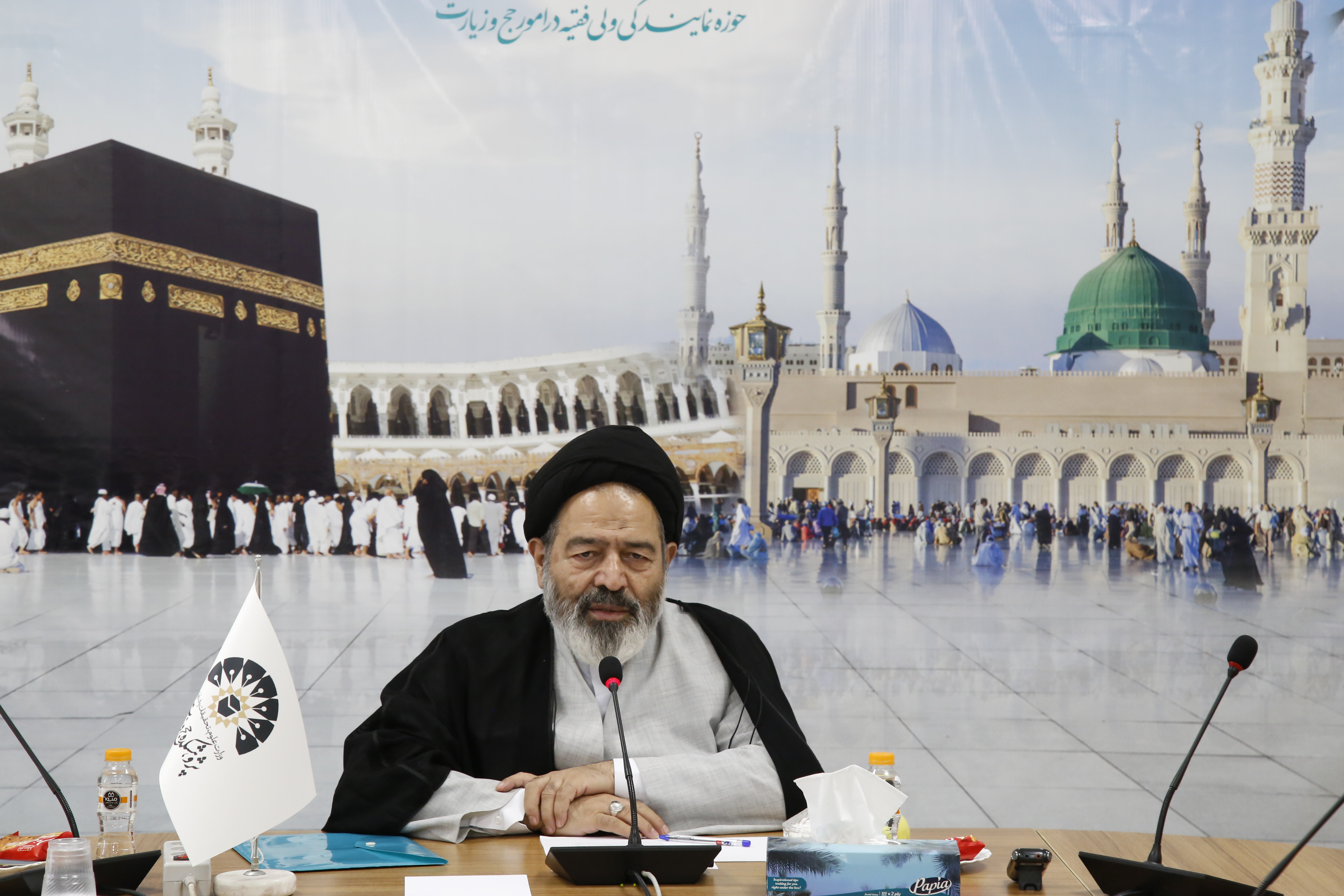Cultural, Social Experts Invited to Cooperate With Hajj and Pilgrimage Research Institute
The Supreme Leader's Representative in Hajj and Pilgrimage Affairs Hojjat al-Islam Seyed Abdolfattah Navvab invited cultural and social experts to convey their opinions and solutions to improve the level of interactions, as well as cultural policies to the Research Institute of Hajj and Pilgrimage Organization.
According to the Hajj Information Base, a joint meeting of the members of the seminary's Social Studies Association with Hojjat al-Islam Navvab was held on Thursday afternoon at the Hajj and Pilgrimage Research Center in Qom.
At the beginning of this meeting, Hojjat al-Islam Navvab honored the memory of the martyrs of the resistance, especially martyr Sayyed Hassan Nasrallah, and while addressing the indescribable desire of the Iranian people to visit holy places said, "Millions of people in Iran visit holy places every year, which is an important capacity for our country."
"Nearly 900,000 people are waiting for Hajj and nearly six million people are waiting for Umrah. This process of pilgrimages requires careful sociological considerations and we invite sociological experts who are well-versed in religious aspects and rituals to examine its capacities and potential harms from a specialized sociological perspective," he added.
Hojjat al-Islam Navvab pointed out that during the pilgrimages of Hajj and Umrah, the spiritual caravan faces different tastes of pilgrims in two time periods of one month and ten days. Sociological studies to communicate and create a communication bridge, as well as to investigate possible damages are a great help to the Supreme Leader's delegation, which "we hope to achieve these results in specialized meetings with sociology professors", he added.

He noted that fortunately, the Supreme Leader's delegation and Hajj Organization have tried to examine and diagnose various cultural and executive processes and in recent years, and they have witnessed cultural improvement at different levels of the delegation and the Hajj organization.
Referring to the community of one and a half million people related to Hajj and Pilgrimage affairs, the representative of the Supreme Leader in Hajj affairs invited all cultural and social experts to convey their opinions and solutions to improve the level of interactions, as well as cultural policies to the Research Institute of Hajj and Pilgrimage.
In this meeting, Dr. Parsania, a member of the Supreme Council of the Cultural Revolution and the Dean of the Faculty of Social Sciences of Bagheral Uloom University, praised the holding of this meeting, and said: "Fortunately, we are witnessing a high capacity in the field of social science studies with strict respect for religious and cultural dimensions, and these two are a good supplement for investigating the social contexts of religious events.
He pointed to the existence of a gap in the analysis of religious rituals from a social and sociological point of view, and said, "The field of cultural policy, as well as the International Muslim Knowledge Association has a high capacity to investigate the roots and social issues of religious and pilgrimage tourism."
In the continuation of this meeting, 10 faculty members of different universities in sociology fields who had a history of honoring or cooperating with the delegation of the Supreme Leader expressed their opinions and views.
These people redefine religious tourism and pilgrimage and its relationship with each other, the necessity of defining the theoretical obstacle of "Sociology of Pilgrimage" with a macro view of the needs of the Islamic world, using the field of cultural policymaking and the International Muslim Knowledge Association in theoretical studies of Hajj and Pilgrimage, pathological investigation "Ritualism" with regard to the high goals outlined for Hajj in Islam and defining the issue of Hajj in the form of a long-term process and not limited to a specific time of pilgrimage, they pointed out.
Examining the methods of prolonging the Hajj journey in the family and those around the pilgrims and beyond the time of the journey using sociological opinions, the impact of sociological opinions in improving the level of communication between the clergy and pilgrims and the need for theoretical studies in this field, the potential harms of the industrialization of pilgrimages, including the Hajj and the need for a serious study about it, the transformation of the spiritual communication of the caravan and the pilgrim from the audience-oriented method to the user-oriented method, the trans-spatial and trans-temporal nature of the communication system, and the necessity of specialized cultural and social training for the pilgrims before the Hajj journey were among the other axes raised in the opinions and views of these people.
Based on this report, at the end of this meeting, it was decided to form a joint working group between the Social Studies Association of the area and the Hajj and Pilgrimage Research Institute to form various plans and projects for the sociology of pilgrimage.



